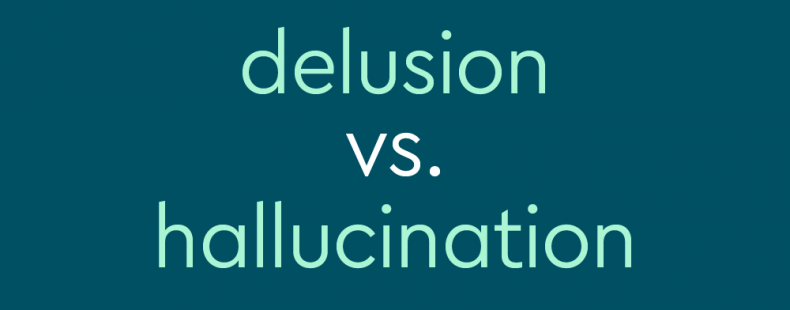We hear the words hallucination and delusion mentioned in discussions about mental health, lists of medication side effects, and in general conversation—sometimes interchangeably. In all three contexts, they involve perceiving things not based in reality. But is there a clinical difference in a medical context?
Their meanings and differences are important, because hallucinations and delusions, like many other aspects of mental conditions, can carry strong stigma. Being respectful and using the terms precisely can avoid perpetuating that stigma.
In this article, we’ll address the technical differences between hallucinations and delusions from a psychiatric perspective and discuss the more general uses of the terms—including when their casual use can be inappropriate or disrespectful.
⚡ Quick summary
In the context of psychology, a hallucination is a seemingly real sensory experience—like seeing or hearing things—that takes place entirely in the mind, especially as a result of a mental disorder or the use of certain substances. A delusion is a false, persistent belief that is resistant to all reason, especially as a symptom of a mental illness. Both words are sometimes used in a more general way to refer to any notion not based in reality, which can perpetuate the stigma of mental illness.
What is a hallucination?
A hallucination is “a sensory experience of something that does not exist outside the mind, caused by various physical and mental disorders, or by reaction to certain toxic substances, and usually manifested as visual or auditory images.”
The terms sensory, visual, and auditory are key to understanding hallucinations in clinical terms—they involve experiences that seem real, such as seeing and hearing things that are not really there. A hallucination can involve any of the senses.
Hallucinations are symptoms of various mental disorders, such as schizophrenia and other forms of psychosis, as well as conditions like Alzheimer’s disease and brain tumors. They can also be caused by the use of certain drugs (called hallucinogenic drugs) and other substances (called hallucinogens).
In casual speech, hallucination is sometimes used interchangeably with other words that refer to experiences not based in reality, such as illusion or delusion. But the word delusion means something different in clinical terms.
What is a delusion?
A delusion is “a false belief or perception strongly held in spite of evidence to the contrary, especially as a symptom of mental illness.” People diagnosed by psychiatrists as having delusions are those who hold a belief that doesn’t correspond to external reality and that is completely resistant to all reason and evidence. Such delusions are often beliefs that are demonstrably untrue. They are often caused by conditions such as schizophrenia and other mental conditions. Many delusions are based in paranoia—someone may hold the delusion that they are constantly being followed by secret agents (despite never actually having seen them). Other delusions (called delusions of grandeur) involve an inflated sense of importance—a person may hold the delusion that they are a celebrity or even a supernatural figure.
Of course, we all know people who stick to beliefs we think are utterly false. And we might refer to these beliefs as delusions (and, even more critically, describe the people who hold them as delusional). However, to meet the criteria that constitute a delusion in clinical terms, a belief must be clearly false to other people with a similar background and be one that remains unchanged despite clear evidence. In psychiatric terms, it would be inappropriate to call any religious belief or political opinion a delusion because both are typically matters of faith and values, rather than things that can be disproved.
Still, the word delusion—even more than hallucination—is commonly used in a general way to mean “any belief considered false, whether or not it means the clinical criteria.” The term delusions of grandeur is most often used outside of a psychiatric context to criticize people who think too highly of themselves. There are many cases in which using these terms can stigmatize mental health issues. The adjective delusional can be especially offensive because it’s often used to criticize someone by likening their beliefs or behavior to those of someone who has a mental illness.
What is the difference between a hallucination and a delusion?
In clinical terms, a hallucination involves some form of sensory experience—hearing, seeing, or touching something that does not exist in external, physical reality (that is, outside the mind).
On the other hand, delusions are more conceptual. They involve broader beliefs about reality or a person’s situation—such as about who they are or the circumstances of their life.
Some forms of mental illness, such as schizophrenia, can involve both hallucinations and delusions.
Examples of hallucination and delusion used in a sentence
The following sentences are examples of how hallucination and delusion are commonly used and illustrate their differences.
- Visual and auditory hallucinations are a common symptom of some forms of psychosis.
- Taking a hallucinogenic drug like LSD often results in hallucinations.
- Many of my patients’ delusions involve some form of perceived persecution.
- We have tried to persuade him that it is a delusion, but nothing we say or do can convince him of the truth.














